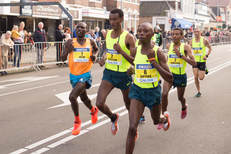 Novel writing is a marathon, not a sprint. Ever start reading a novel finding the opening so intriguing that you anticipate a brilliant read only to find yourself half way through thinking "this is a total waste of time"? A lot of authors slave away at the opening in order to hook the reader only to peter out along the way. It's tough to sustain a wonderful narrative. Novel writing is like running that marathon. The good runners don't dash from the starting line giving it all over the first 100 to 200 yards. Instead, they pace themselves, knowing that there are many miles to go before the finish line. They conserve energy when necessary, coasting down hills when they can and turning on the afterburners when they need to pass an opponent. They take advantage of hydration stations along the route. Overall, they maintain a steady rhythmic pace and have strategically evaluated the course beforehand. And, more importantly, they have prepared prior to the race by training regularly and maintaining proper nutrition. Writing a novel requires similar preparation and execution. You need the long view to complete your great work. Poems can be tackled in a day to a week. Short stories may take a week to a month to write. But, your novel will usually take six months to two years to complete. Over such a long period of time it’s easy to get bored or exhausted and give up. And, this is precisely why you need to approach your writing like a runner engaged in a marathon. So, what do you need to do to run the course and cross the finish line? Here are a few recommendations: · Develop a theme. Having a theme is like having members of your entourage along the marathon route at strategic points to cheer you on just as you begin to feel too exhausted to take another step. When you’re knee deep in manuscript pages and feel lost, your theme serves as your guiding beacon. By reviewing your theme your inspiration returns and, now renewed, you are able to continue writing. · Outline. Outlining your novel before writing is like reviewing the route of the race before you run that marathon. You’ll have an idea of when the writing will be easy and you can breeze through several chapters and when you’ll have to slog through the difficult parts. More importantly, you’ll know where you’re going and have an idea of how long it will take. · Write regularly. Following a regular writing routine is akin to that steady running pace a marathoner must make to complete the race in a personal best time. Set a goal of x number of pages or words per day. That steady rhythm of daily writing will keep you on pace to complete your work. · Craft a great opening. If you’ve ever watched a marathon you’ve noticed that at the start of the race the runners get right into the stride they want to maintain throughout the twenty-six miles. Your opening should do the same. The conventional wisdom is that you start your story in the middle. In other words, don’t begin with a long meandering backstory. This was popular in Victorian novels, but not in today’s works. You want to engage your audience from the first paragraph. · Practice, practice, practice. You won’t find any marathoners finishing a race only to turn into a couch potato until the next scheduled race. Not on your life. They’re constantly training. And so should you. Write short stories. Write poems. Write essays. Write blogs. Between novels, write! · Read and read some more. Nutrition is important for marathon runners. They watch their weight. They maintain the right balance of carbohydrates and fats. They hydrate. Some even drink beet juice. As a writer your nutrition is books. Read and read some more. Read novels similar to the ones you write and ones in other genres. If you write romances, then read thrillers and mysteries. If you write thrillers, read literary works. Also, read biographies, history, current events, science. You get the idea. There it is. Take the long view and you can’t go wrong. Because writing a novel is like running a marathon.
0 Comments
Leave a Reply. |
Archives
June 2023
Categories |
 RSS Feed
RSS Feed